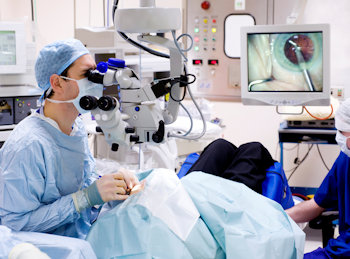What Happens When You Have Cataract Surgery?
Cataract surgery is quick and clear vision is usually restored within a few days. Find out what happens when you have cataract surgery from the experts at Elmquist Eye Group.

About Cataract Surgery
Traditional cataract surgery involves making a tiny incision on the side of the cornea to remove the cataract-clouded lens. This is done by using a hand-held instrument that has a metal blade. Then, using a process called phacoemulsification, ultrasound waves break up the cataract so it can be suctioned out. Once removed, an artificial IOL is inserted to replace the natural lens. The corneal tissue then heals itself without the need of any sutures.
We can now use laser technology to perform many of the traditional cataract surgery steps. 3D imaging allows the surgeon to map out the unique characteristics of your eye and cataract so that very precise incisions can be made. Instead of a hand-held instrument, the surgeon uses a special laser to make the incision in the cornea as well as to break up the cloudy lens and remove it. Refractive laser-assisted cataract surgery is incredibly accurate and provides for quick recovery and the best visual outcomes possible.
Whether traditional or laser-assisted cataract surgery is right for you will depend on a number of factors that can only be assessed by your cataract surgeon. Both procedures are extremely safe, common, and have high success rates.
Do You Have the Symptoms of a Cataract?
Although most cataracts are age-related, you don’t have to be a senior citizen to get one. Individuals can have an age-related cataract in their 40s and 50s, but they are usually small and do not affect vision. It is after the age of 60 that cataracts are most responsible for diminished vision.
Symptoms of a cataract may include blurred or double vision, glare or haloes from lights, poor night vision, and frequent changes in prescription for your eyeglasses or contact lenses. The first evidence of a cataract is usually detected during a cataract evaluation.
If you believe you may have a cataract and want to know more about what happens when you have surgery, get in touch with Elmquist Eye Group at (239) 936-2020. We will examine your eyes and discuss how the latest cataract treatments and lens technologies can help restore your clear vision.
